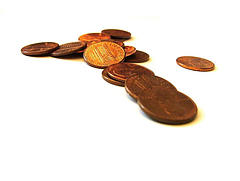 High interest rate savings accounts are useful tools for emergency cash reserves and intermediary savings vehicles. But every year the extra money you leave in your account is worth less than the year before. How much less? Anywhere from 1-2% less. That means the hundred dollars you left in your account last year is only worth $99 today. And next year it will be worth $98. How can that be when your high yield savings account is paying 3.00% to 4.00% every year?
High interest rate savings accounts are useful tools for emergency cash reserves and intermediary savings vehicles. But every year the extra money you leave in your account is worth less than the year before. How much less? Anywhere from 1-2% less. That means the hundred dollars you left in your account last year is only worth $99 today. And next year it will be worth $98. How can that be when your high yield savings account is paying 3.00% to 4.00% every year?
There are two major factors that affect your return and make you lose money; inflation and taxes. For every dollar of interest you make each year Uncle Sam takes 30%. The government treats your interest as income and taxes you on it. You just lost $1 of the $3 you earned in interest. Your year-end gain is now $2 on your hundred-dollar investment.
The next negative force affecting your investment is inflation. Inflation in the United States has been 3% to 4% every year historically. You can expect to have your money worth 3 to 4 percent less year-after-year because the Federal Reserve keeps pumping money into the economy. This means the $102 balance in your savings account can only buy $99 worth of goods and services this year. Your hundred dollars is now worth less than when you started a year ago.
Does this mean you shouldn’t have any money in a high interest online savings account? No. The alternative is far worse. If you kept your money in a checking account, regular bank savings account, or stuffed your money in a mattress the scenario would be three to four times worse. Instead of losing $1 you could lose $3 to $4 every year. Your money is better in a high yield savings account than not.
The point here is not to get too excited with online savings accounts returns. They will help you ‘tread water’ but you won’t build your wealth. You might consider a non-FDIC-Insured money market account for slightly higher yields but money there shouldn’t be considered ‘investments’ either. In the end you want most of your money in real investments like stocks, mutual funds, real estate, and/or bonds.
Please leave a comment if you have any further recommendations on this subject.

